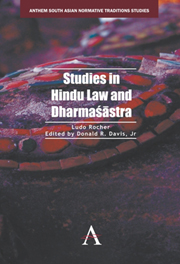Book contents
- Frontmatter
- Contents
- Foreword by Richard W. Lariviere
- Preface
- Abbreviations
- Note on the Edition
- Introduction
- PART ONE THE NATURE OF HINDU LAW
- PART TWO GENERAL TOPICS OF HINDU LAW
- PART THREE HINDU LEGAL PROCEDURE
- PART FOUR TECHNICAL STUDIES OF HINDU LAW
- Possession Held for Three Generations by Persons Related to the Owner
- The Vīramitrodaya on the Right of Private Defence
- The Technical Term Anubandha in Sanskrit Legal Literature
- The Kāmasūtra: Vātsyāyana's Attitude toward Dharma and Dharmaśāstra
- In Defense of Jīmūtavāhana
- Dāsadāsī
- The Definition of Vākparuṣya
- Janmasvatvavāda and Uparamasvatvavāda: The First Chapters on Inheritance in the Mitākṣarā and Dāyabhāga
- Karma and Rebirth in the Dharmaśāstras
- Notes on the Technical Term Sāhasa: “Fine, Pecuniary Penalty”
- Avyāvahārika Debts and Kautilya 3.1.1–11
- The Sūtras and Śāstras on the Eight Types of Marriage
- Caritraṃ Pustakaraṇe
- The Terms Niyukta, Aniyukta, and Niyoga in Sanskrit Legal Literature
- The Aurasa Son
- The Introduction of the Gautamadharmasūtra
- PART FIVE ANGLO-HINDU AND CUSTOMARY LAW
- Bibliography
- Index
Dāsadāsī
from PART FOUR - TECHNICAL STUDIES OF HINDU LAW
Published online by Cambridge University Press: 05 February 2013
- Frontmatter
- Contents
- Foreword by Richard W. Lariviere
- Preface
- Abbreviations
- Note on the Edition
- Introduction
- PART ONE THE NATURE OF HINDU LAW
- PART TWO GENERAL TOPICS OF HINDU LAW
- PART THREE HINDU LEGAL PROCEDURE
- PART FOUR TECHNICAL STUDIES OF HINDU LAW
- Possession Held for Three Generations by Persons Related to the Owner
- The Vīramitrodaya on the Right of Private Defence
- The Technical Term Anubandha in Sanskrit Legal Literature
- The Kāmasūtra: Vātsyāyana's Attitude toward Dharma and Dharmaśāstra
- In Defense of Jīmūtavāhana
- Dāsadāsī
- The Definition of Vākparuṣya
- Janmasvatvavāda and Uparamasvatvavāda: The First Chapters on Inheritance in the Mitākṣarā and Dāyabhāga
- Karma and Rebirth in the Dharmaśāstras
- Notes on the Technical Term Sāhasa: “Fine, Pecuniary Penalty”
- Avyāvahārika Debts and Kautilya 3.1.1–11
- The Sūtras and Śāstras on the Eight Types of Marriage
- Caritraṃ Pustakaraṇe
- The Terms Niyukta, Aniyukta, and Niyoga in Sanskrit Legal Literature
- The Aurasa Son
- The Introduction of the Gautamadharmasūtra
- PART FIVE ANGLO-HINDU AND CUSTOMARY LAW
- Bibliography
- Index
Summary
Introduction
The Dharmaśāstras do not encourage anuloma marriages. Yet they are concerned about the inheritance of sons born of marriages in which the wife's varṇa is lower than that of her husband. To be sure, the higher the varṇa of the wife, the larger the share of the son, but all legitimate anuloma sons, including the son of a Brahmin and a Śūdra wife, are entitled to fixed shares.674 Just as sons of legally wedded wives of twice-born varṇas are, the son of a Śūdra wife is rikthabhāk: he is entitled to a share of the estate in his own right. And, since a son by a Śūdra wife is the only possible legitimate son for a Śūdra husband, he inherits the entire estate of his father.
The śāstras are less favorably disposed toward sons born out of wedlock. As a rule, illegitimate sons of twice-born fathers may be given maintenance, but they cannot claim a share in the inheritance: they are not rikthabhāk. For sons of twice-born males and Śūdra females in particular, there are a number of rules that either prescribe maintenance or say that they are not rikthabhāk; these texts are most often interpreted as referring to illegitimate sons.
First, Gautama:
Śūdrāputro 'py anapatyasya ŚuŚrūṣuŚ cel labheta vṛttimūlam antevāsividhinā. (28.39)
Following the Vra, Colebrooke (1798: 5.169) translated anapatya as “a man who leaves no legitimate offspring.”
Second, a verse from Bṛhaspati agrees perfectly with Gautama:
anapatyasya ŚuŚrūṣur guṇavāñ chūdrayonijaḥ labhetājivanaṃ; Śeṣaṃ sapiṇḑāḥ samavāpnuyuḥ. (26.125/tr. 25.31)
- Type
- Chapter
- Information
- Studies in Hindu Law and Dharmasastra , pp. 503 - 512Publisher: Anthem PressPrint publication year: 2012
- 1
- Cited by



